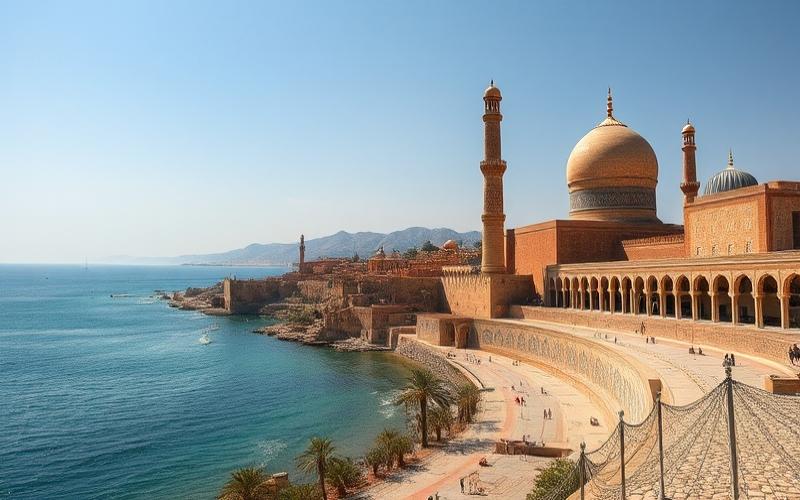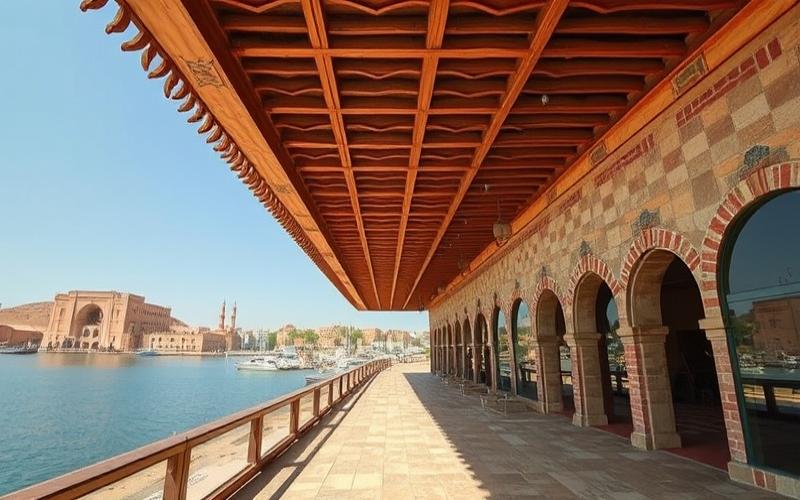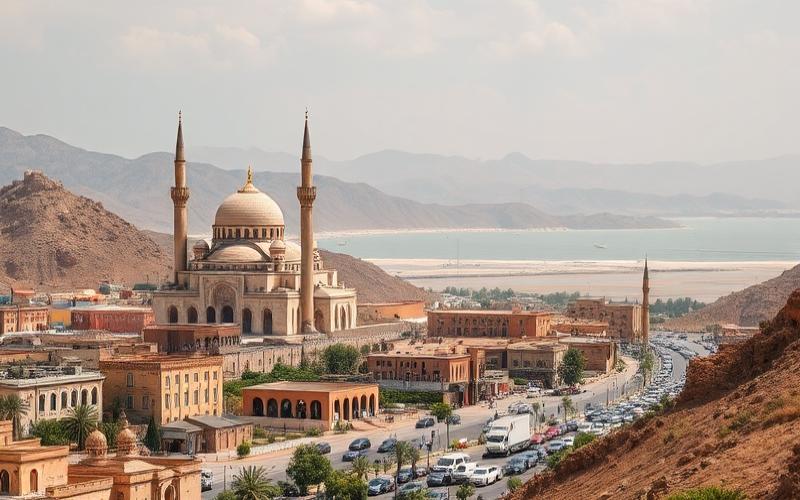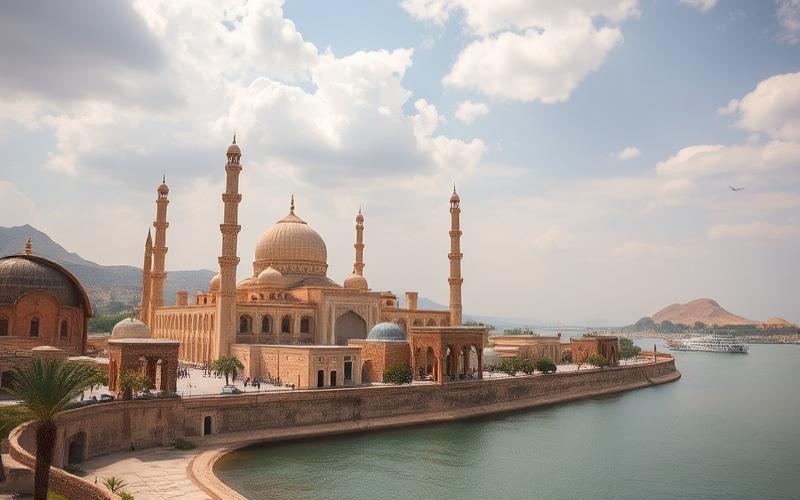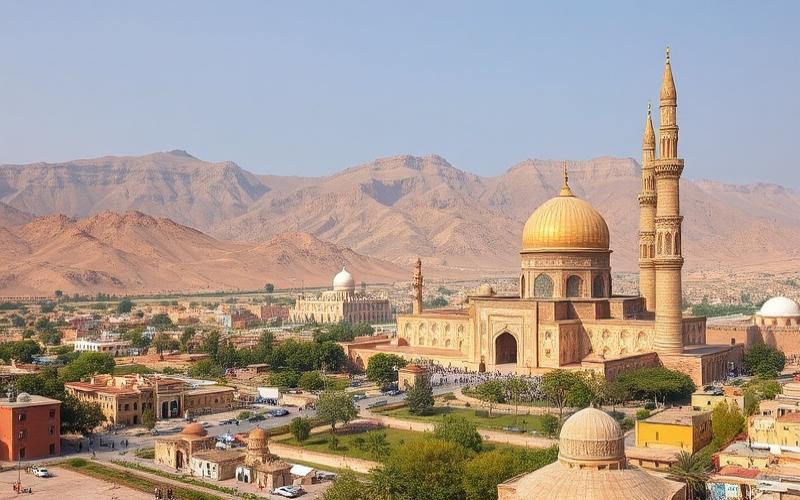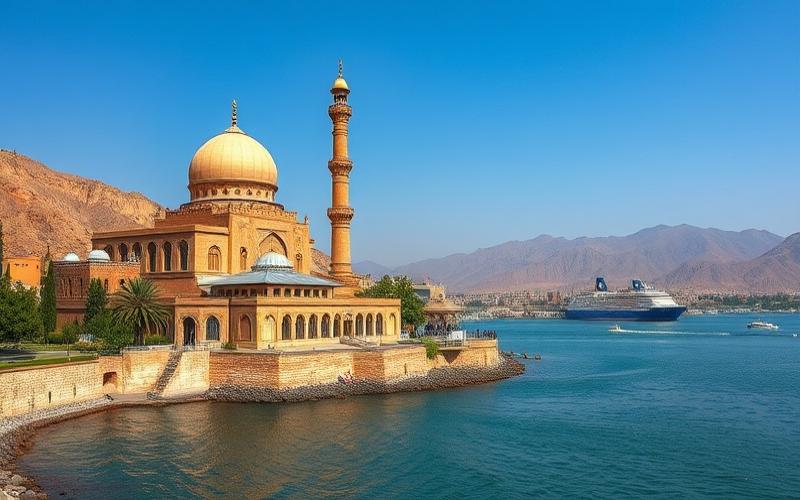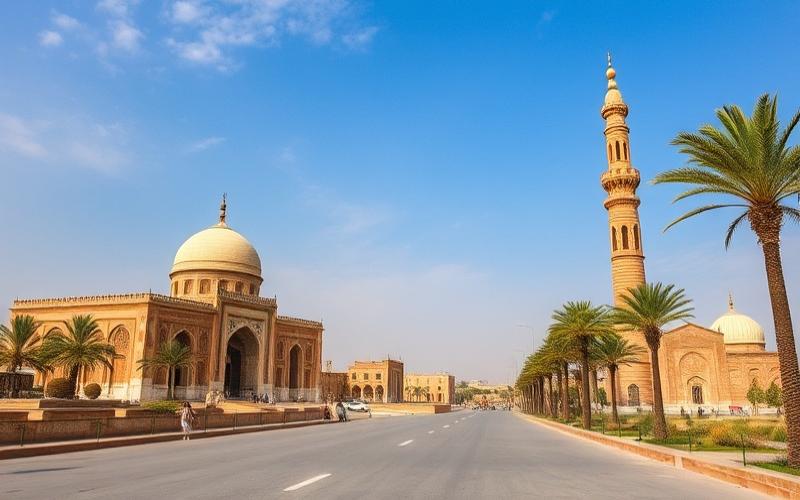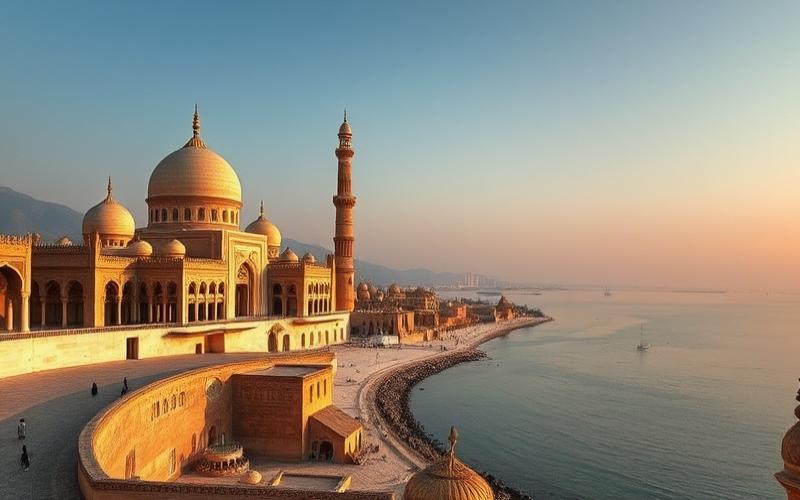
 Published on and written by Cyril Jarnias
Published on and written by Cyril Jarnias
Bahrain, a small island in the heart of the Arabian Gulf, offers a unique healthcare system where both public and private coverage coexist. While the government promotes a universal system accessible to all citizens, many opt for private insurance to benefit from faster services and specialized care.
This duality raises crucial questions about healthcare equity, efficiency, and accessibility. At a time when many countries are reviewing their health policies, Bahrain’s case could offer interesting perspectives on the dynamics between public and private sectors in healthcare.
Overview of Public and Private Healthcare Systems in Bahrain
Healthcare System in Bahrain: Detailed Description of Public and Private Sectors
The Bahraini healthcare system rests on two main pillars: the public sector and the private sector, both regulated by the National Health Regulatory Authority (NHRA) and overseen by the Ministry of Health (MOH).
Organizational Structure
| Sector | Supervising Body | Main Facilities | Target Population |
|---|---|---|---|
| Public | Ministry of Health (MOH), NHRA | Salmaniya Medical Complex, KHUH, specialized hospitals, 21 primary health centers, military hospital, psychiatric hospital | Citizens, expatriates |
| Private | NHRA, MOH (regulation) | 3 private hospitals, clinics, polyclinics, specialized centers | Expatriates, citizens |
Types of Services Offered
Public Sector:
- Primary care through 21 health centers distributed nationwide
- Specialized hospital services: cardiology, oncology, pediatrics, maternity, orthopedics, emergency care, psychiatry, geriatrics
- Maternal health, pediatric health, mental health, and rehabilitation services
- 24/7 emergency services
Private Sector:
- General practitioner and specialist medical consultations
- Elective surgery, dental care, aesthetic medicine
- Complementary services: physiotherapy, advanced diagnostics, personalized care
- Reduced waiting times, increased comfort, rapid care
Main Differences Between Public and Private Sectors
| Criterion | Public Sector | Private Sector |
|---|---|---|
| Cost for Residents | Free or low cost for citizens; moderate fees for expatriates | Patient’s responsibility or covered by mandatory insurance for expatriates |
| Accessibility | Broad geographic coverage; sometimes longer wait times | Short delays, rapid services, often in urban areas |
| Perceived Quality | High standards, modern equipment; occasional overcrowding | Modern infrastructure, more personalized experience |
| Population Served | Primarily citizens, but also expatriates | Expatriates, citizens seeking comfort or speed |
| Health Insurance | National coverage for citizens | Mandatory insurance through employers for expatriates |
Government Role
- Funding: The public sector is primarily funded by the national budget, allowing free or nearly free care for Bahrainis.
- Regulation: The NHRA oversees quality, safety, and accreditation of facilities and practitioners, both public and private.
- Coordination: Policies to ensure integration and continuity of care between sectors.
Relevant Statistics
- Public Facilities: approximately 21 primary health centers, 1 major medical complex (SMC), 1 university hospital (KHUH), 1 military hospital, 1 psychiatric hospital, 4 maternity hospitals.
- Private Facilities: 3 major private hospitals, numerous clinics, polyclinics, and specialized centers.
Access to Care and Cost
- Citizens: free or very low-cost access in the public sector.
- Expatriates: mandatory private health insurance (covered by employer); patient-responsible fees in private sector or moderate in public sector.
Testimonials and Case Studies
Some expatriates report preferring the private sector due to faster care, even though costs are higher. Citizens appreciate the free and quality public care but sometimes complain about wait times, especially for specialized care.
Example: an expatriate family, covered by employer insurance, consistently chooses private care for quick pediatric consultations, while a Bahraini citizen prefers SMC for maternity, benefiting from free and comprehensive support.
Quality and Satisfaction Comparison
| Aspect | Public Sector | Private Sector |
|---|---|---|
| Quality of Care | Good, sometimes overcrowded | Excellent, more individualized |
| User Satisfaction | Generally high, criticism about wait times | Very high, higher cost |
| Challenges | Patient flow management, modernization, delays | Financial accessibility, service segmentation |
| Improvement Opportunities | Digitalization, demand management, service integration | Better collaboration with public sector, cost regulation |
Challenges and Opportunities
- Public Sector: need to modernize infrastructure, reduce wait times, strengthen coordination with private sector.
- Private Sector: ensure accessibility for all, avoid excessive service segmentation, strengthen price regulation.
The healthcare system in Bahrain offers comprehensive and quality coverage but faces challenges in demand management and accessibility for certain groups. The complementarity of both sectors, under strong government regulation, represents an asset for the population.
Good to Know:
In Bahrain, the public healthcare system is largely government-funded, offering free or reduced-cost services, while the private sector, although generally more expensive, is known for its modern infrastructure and personalized service. The country has approximately 29 public and private hospitals, and access to private care may be faster but at a higher cost for residents.
Differences Between Health Insurance for Local Residents and Expatriates
| Criterion | Local Residents (Bahraini Citizens) | Expatriates in Bahrain |
|---|---|---|
| Public Health Coverage | Complete and free/subsidized access to primary, secondary, and tertiary care in public facilities. | Limited access to public system; mandatory enrollment in public fund (SHIFA) but less extensive coverage. |
| Complementary/Private Insurance | Can purchase private insurance to cover certain specialized care or private sector; often not mandatory. | Often essential, especially for those wanting international coverage or private care. Broader international health insurance options. |
| Estimated Average Annual Cost (Local Insurance) | Low or none, covered by the state. | Mandatory contribution covered by employer for employees; personal cost for unemployed/self-employed. Private insurance: much higher depending on coverage level chosen. |
| Access to Partner Healthcare Providers | “National network”: public hospitals and subsidized medical centers; facilitated access. | Private sector preferred; international network recommended via expatriate insurance for better coverage outside Bahrain. Restricted access to public facilities depending on insurance category chosen. |
Legal Obligations
- Both groups must contribute to the SHIFA health insurance fund.
- For citizens: contribution is state-funded.
- For employed expatriates: contribution paid by employer.
- Non-employed or self-employed expatriates must pay contributions themselves.
Major Coverage Differences
- Local residents benefit from free/subsidized services with broad access to public infrastructure.
- Expatriates have limited access to these benefits and often rely on private/international insurance that covers more (including care outside the country).
Impact of Public/Private Policies
- Public policy strongly favors citizens with direct state funding and a dense national network.
- Policy toward expatriates encourages use of private sector, generating higher costs and dependence on international insurers.
Main Distinctive Points:
- Local residents are primarily protected via the state-funded public system.
- Expatriates must enroll in SHIFA then supplement their protection via international insurance, essential to guarantee good care levels, especially in private sector or during stays outside the country.
- Overall cost is significantly higher for expatriates while their provider choice largely depends on the type of insurance purchased.
Good to Know:
In Bahrain, local residents often benefit from reduced rates in public hospitals compared to expatriates, who generally must pay higher private insurance premiums; moreover, expatriates are often required to purchase private health insurance to obtain their visa, unlike locals.
Evaluation of International Health Insurance Options in Bahrain
International Health Insurance Options in Bahrain:
| Option | Coverage | Cost | Advantages | Disadvantages | Ideal For |
|---|---|---|---|---|---|
| Local Health Insurance | Limited to Bahrain | Relatively low | Easy access, suitable for short stays, simple to purchase | Limited coverage, little access to care abroad, frequent exclusions | Short-term expatriates, low medical risk |
| First Euro International Insurance | Worldwide, including outside Bahrain | Higher | Comprehensive coverage, access to best hospitals, rapid care, international management | More expensive premium, sometimes longer procedures, exclusions based on age/health | Long-term expatriates, families, high-needs profiles |
| CFE Complementary Insurance | Complements CFE (Caisse des Français de l’Étranger) coverage | Variable by profile and guarantees | Benefits from CFE + insurer networks, simplified management for French citizens, complementarity | CFE partially reimburses in Bahrain (e.g., 50% hospitalization), sometimes complex procedures | French expatriates, Franco-Bahraini families |
| Specific Youth Insurance (e.g., Indigo Expat Junior) | Worldwide, adapted to youth, working holidays, students | Moderate | Flexibility, attractive pricing, common guarantees, simple subscription | Lower caps, limited options, age restrictions | Young professionals, students, temporary stays |
Concrete Examples of Popular International Insurances in Bahrain:
- MSH International: known for rapid case management, broad coverage, multilingual services.
- Indigo Expat (WeCare, OnePack, Junior): modular plans, adapted to all expatriate profiles, including youth.
- CFE + private complementary: preferred solution for many French citizens, especially with recent coverage zone changes.
Comparison with Local Public and Private Programs:
| Criterion | Local Insurance | International Insurance |
|---|---|---|
| Coverage | Care in Bahrain, often limited to certain facilities | Care in Bahrain + abroad, access to best global networks |
| Cost | Lower, but potentially high for major care | Higher, but extensive protection and higher caps |
| Accessibility | Simple on-site subscription, sometimes required by employer | Online subscription, centralized management, multilingual assistance |
| Expatriate Adaptation | Poorly adapted to specific needs or mobility | Specifically designed for mobility, international coverage |
Potential Tax Implications for Foreign Residents:
- International health insurance premiums are generally not tax-deductible in Bahrain (no personal income tax).
- If tax-resident in another country (e.g., France), subscribing to CFE and complementary insurance may have consequences on worldwide income taxation or tax residency.
- Some home countries require proof of international insurance to avoid double contribution or guarantee continuity of social rights.
Recent Trends and Regulatory Changes:
- Medical inflation: significant rise in healthcare costs in Bahrain, prompting insurers to review prices and caps.
- CFE: Bahrain moved from zone 1 to zone 2 in 2024, reducing reimbursement rate (e.g., hospitalization covered at 50%), making international complementary insurance even more essential.
- Strengthened visa requirements: growing obligation to justify comprehensive health insurance to obtain or renew residence visas.
- Digitalization: evolution of services (teleconsultations, online reimbursement management), rapid adaptation of international insurers to meet connected expatriates’ needs.
Key Takeaways:
- International health insurance remains the most comprehensive and suitable solution for expatriates in Bahrain, despite higher cost than local insurance.
- Youth and students can opt for specific, more economical plans, but with capped guarantees.
- Recent CFE reimbursement changes and rising local care costs encourage choosing robust international coverage.
- It’s crucial to compare offers based on stay duration, family profile, health status, and planned international mobility.
Good to Know:
In Bahrain, Allianz Care and Cigna Global are among the international health insurances favored by expatriates, offering broader coverage than local options, although often at higher cost and with possible tax implications; recent regulations increasingly encourage foreign residents to combine international and local insurance for optimal protection.
Disclaimer: The information provided on this website is for informational purposes only and does not constitute financial, legal, or professional advice. We encourage you to consult qualified experts before making any investment, real estate, or expatriation decisions. Although we strive to maintain up-to-date and accurate information, we do not guarantee the completeness, accuracy, or timeliness of the proposed content. As investment and expatriation involve risks, we disclaim any liability for potential losses or damages arising from the use of this site. Your use of this site confirms your acceptance of these terms and your understanding of the associated risks.





















